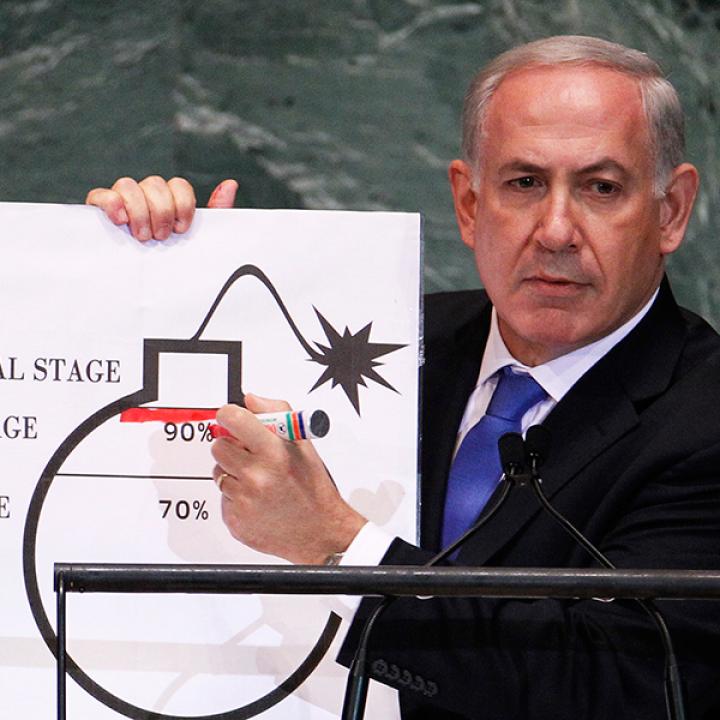

If the Iranian nuclear program is not stopped by sanctions, military threats, other means of pressure or diplomacy, Israel will return to the point of decision beginning in the spring -- and accompanied by Netanyahu's public commitment.
Was the prime minister justified when he publicly drew a red line on the Iranian nuclear program? Red lines have advantages and disadvantages. The advantage lies in the possibility of creating a deterrent that will stop the advancement of your opponent toward a goal that is dangerous for you. The disadvantage is that it can be inferred from this that the opponent is "permitted" to advance to that point, and the initiative and decision when to push on further remain in his hands. If he goes beyond the red line you've set, you have to stop him or risk eroding your deterrence.
Thus, for a policy of this kind to succeed, several conditions are necessary. The lines have to refer to a real strategic challenge; the person drawing them has to be determined to follow through even at the price of a military confrontation; and the other side must understand well, and believe, that if it goes beyond them, it will risk a confrontation of that kind. All the other relevant players -- in our case, the United States and the international community - also have to see things in the same way.
Is that the case now with regard to Iran? I'm doubtful. Even though I have witnessed from close up how decisionmakers cause contempt for red lines and at the moment of truth become color-blind, it is clear that what we have here is a critical threat that justifies drawing lines like these, and I do not belittle Prime Minister Benjamin Netanyahu's determination to thwart this threat. However, it is unlikely that the conditions being demanded of the Iranians and the remaining players do exist. Netanyahu's attempt to simplify the red line with a simple illustration from the marketing world created confusion; it was unclear whether he meant 90 percent of the way to the bomb, as many people mistakenly thought, or enrichment of uranium to a level of 90 percent (weapons-grade enrichment ).
But even on the assumption that the Iranians understood him, it is still not clear whether the Israeli threat is sufficiently reliable and serves as a deterrent in their eyes, especially in view of the public gaps between Israel and the United States with regard to the red lines.
Moreover, Israel has weakened the chances of these red lines succeeding by waving them around publicly. The open demand for U.S. President Barack Obama to define red lines in the spirit of the Israeli position forced him to refuse publicly, and thus to sharpen the differences with Israel. And making the threat to Iran in public will not necessarily encourage that country to accept it, lest it be humiliated in the eyes of all the world.
Netanyahu's red line refers to the enriching of enough 20 percent uranium to make at least one bomb, or enriching to a level higher than 20 percent (since the Iranians have already announced their goal as 60 percent, for the propulsion of ships and submarines ). The rationale is that enrichment to a level of 20 percent or higher is dangerous because it enables a speedy breakthrough to a bomb, yet such a process can be carried out even under international inspection at known sites.
The catch here is that if the Iranians take this line seriously, they are likely to feel immune to attack (and on the face of it, there will not be justification for carrying one out ) even if they continue developing other dangerous threshold capabilities. These include the enrichment of uranium to a level of 3.5 percent; the building of additional sites; the fortifying of sites against attacks; operating a new generation of centrifuges; pushing forward on the plutonium nuclear fuel track (which has already advanced to a worrisome degree ); and developing a weapons infrastructure. After all, wasn't it Israel that claimed to the United States, and rightly so, that the Iranians should not be allowed to continue developing a variety of threshold capabilities while remaining immune from attack, nor be allowed to choose the conditions for a breakthrough to nuclear weapons?
If the Iranian nuclear program is not stopped by sanctions, military threats, other means of pressure or diplomacy, Israel will return to the point of decision beginning in the spring -- and accompanied by Netanyahu's public commitment. The hope is that until then, Israel will succeed in formulating quiet understandings with the United States about multidimensional red lines that are not made public, along with understandings about a strategy toward Iran in general.
Brig. Gen. (res. ) Michael Herzog is an international fellow of the Washington Institute for Near East Policy.
Haaretz

